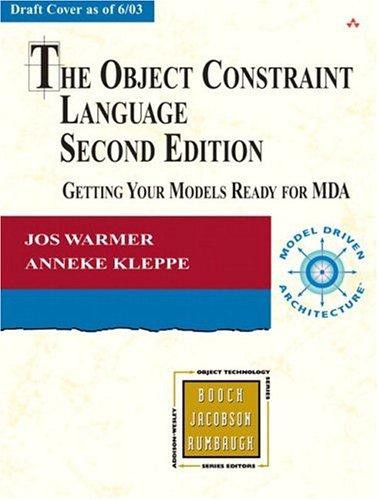

Most ebook files are in PDF format, so you can easily read them using various software such as Foxit Reader or directly on the Google Chrome browser.
Some ebook files are released by publishers in other formats such as .awz, .mobi, .epub, .fb2, etc. You may need to install specific software to read these formats on mobile/PC, such as Calibre.
Please read the tutorial at this link: https://ebookbell.com/faq
We offer FREE conversion to the popular formats you request; however, this may take some time. Therefore, right after payment, please email us, and we will try to provide the service as quickly as possible.
For some exceptional file formats or broken links (if any), please refrain from opening any disputes. Instead, email us first, and we will try to assist within a maximum of 6 hours.
EbookBell Team

4.3
68 reviewsSuccessful software developers have long recognized that proper modeling is a key element to the development process that leads to creating robust software. For the past decade, the Object Constraint Language has offered a more precise (but not very popular) means of expressing a software design -- more precise than even the Unified Modeling Language. The growing acceptance of the Model-Driven Architecture (MDA) approach, and the significant changes to the UML 2.0 standard have placed the OCL near the forefront of object-oriented application development. The OCL no longer represents a level of detail that practitioners are likely to ignore. The OCL is now closely tied to both the UML 2.0 and MDA standardization initiatives. This closeness is certain to lead to an increased level of popularity in this precision language for modeling. This book, from the creators of the language, explains how software professionals can use the OCL to create better software.
From the Back CoverPraise for The Object Constraint Language, Second Edition
“MDA promises a revolution in the way we develop software. This book is essential reading for anyone intending to adopt MDA technology.”
—Tony Clark, PhD
King’s College, London
“Through examples, Jos and Anneke demonstrate the power and intuitiveness of OCL, and the key role that this language plays in implementing and promoting MDA. The theme, structure, contents, and, not lastly, the clarity of explanations recommend this book as the best advocate for learning, using, and promoting OCL, UML, and MDA. I am sure that this work will contribute in a significant manner to the development and widespread use of new software technologies.”
—Dan Chiorean
Head of the Computer Science Research Laboratory
Babes-Bolyai University, Cluj
"In this thoroughly revised edition, Jos and Anneke offer a concise, pragmatic, and pedagogic explanation of the Object Constraint Language (OCL) and its different applications. Their discussion of OCL's potential role in Model Driven Architecture (MDA) is timely and offers great insight into the way that UML can be taken to the next level of automated software development practice. I highly recommend this book to anyone who is looking to get the most out of UML."
*
—Shane Sendall, PhD, Senior Researcher, Swiss Federal Institute of Technology in Lausanne
*
The release of Unified Modeling Language (UML) 2.0 places renewed emphasis on the Object Constraint Language (OCL). Within UML, OCL is the standard for specifying expressions that add vital information to object-oriented models and other object-modeling artifacts. Model Driven Architecture (MDA) relies on OCL to add the level of programming detail necessary to enable platform-specific models (PSM) to communicate with platform-independent models (PIM).
This book is a practical, accessible guide to OCL for software architects, designers, and developers. Much care has been taken during the redesign of OCL to ensure that the syntax remains readable and writable by the average software modeler. The Object Constraint Language, Second Edition , utilizes a case study to show how to exercise these compact but powerful expressions for maximum effect.
This newly updated edition
Using a combination of UML and OCL allows developers to realize the effective, consistent, and coherent models that are critical to working with MDA. The authors' pragmatic approach and illustrative use of examples will help application developers come quickly up to speed with this important object-modeling method—and will serve as a ready reference thereafter.
About the AuthorJos Warmer is the primary author of the OCL standard. He is an active member of the Unified Modeling Language (UML) Revision Task Force, which defined the revisions in the UML 2.0 standard. Previously he was a member of the UML core team, where he was responsible for the development of the Object Constraint Language (OCL). The author of several books and numerous international articles, Jos is an advisor on the UML method and techniques at the De Nederlandsche Bank.
Anneke Kleppe is a consultant and adviser at Klasse Objecten, which she founded in 1995 to train and coach companies on the use of object technology, modeling, and MDA. She was intensively involved in the development of the Unified Modeling Language (UML) and the new UML 2.0 standard. The author of several books, Anneke started a knowledge center for object technology at KPN Research in Leidschendam, Netherlands. She is a member of the authoring team of the OCL 2 standard, where she has a special focus on the definition of the semantics of the OCL.
0321179366AB07222003